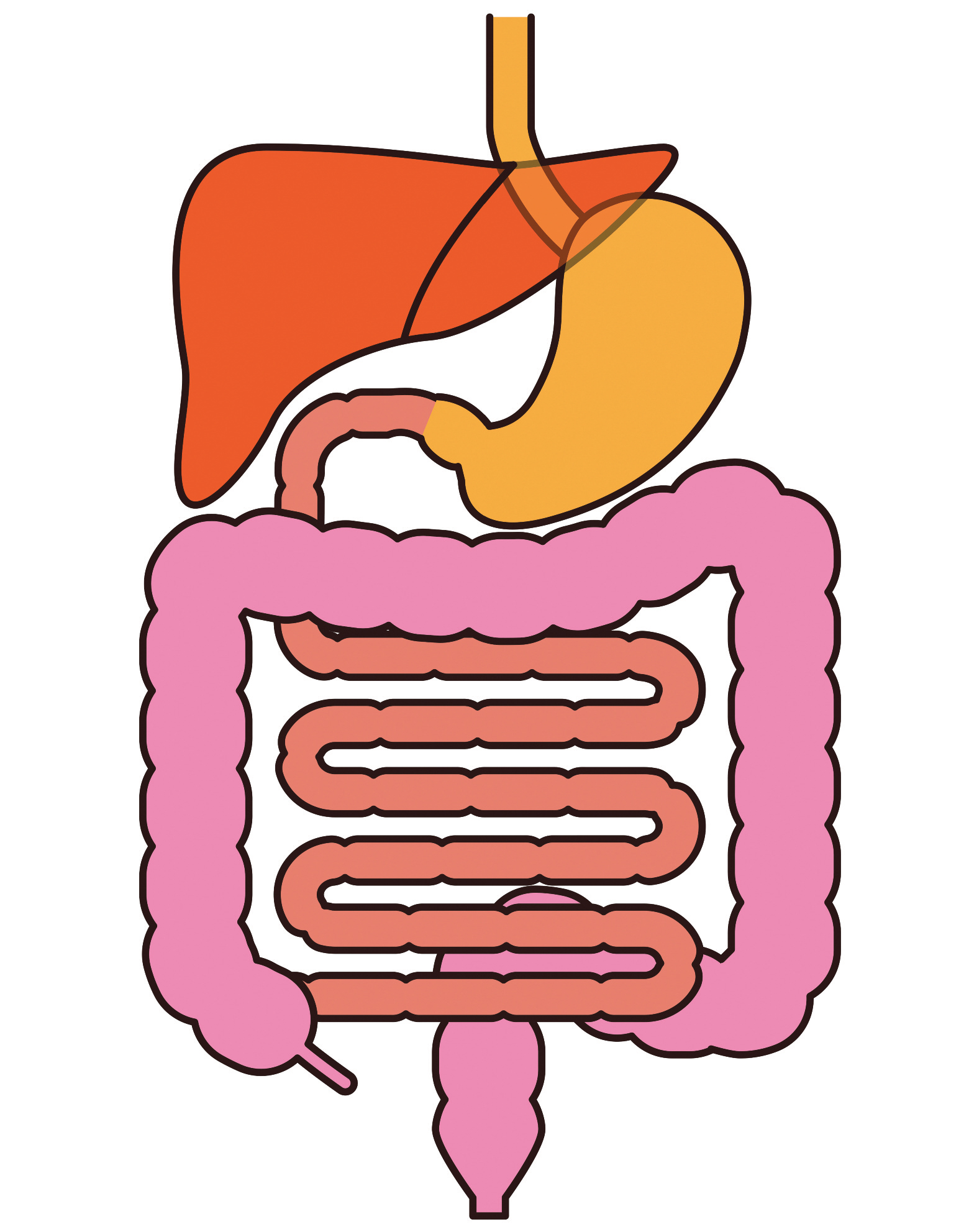Growing interest in digestive health
In Insight
Follow this topic
Bookmark
Record learning outcomes
Many customers will be affected by gut problems at some time, and especially during the festive season. Make sure the team know what to suggest and when to refer them for help

More than half of Britons have suffered with a chronic gut complaint, but a third have never discussed bowel problems with anyone other than a health professional, according to research for this year's Gut Week. At least one in 12 of all GP consultations is prompted by gut and bowel symptoms, while one in 10 deaths and a quarter of all cancer deaths are due to digestive diseases, according to the digestive charity Core.
We're becoming more open about some aspects of digestive health, in particular wheat/gluten intolerance and dairy intolerance. According to Allergy UK, a fifth of us are affected by lactose intolerance, and gluten-free foods account for almost half of the free-from market, according to analysts Mintel. The gluten-free market grew by 15 per cent during 2013/14 while the dairy-free market increased by 15.3 per cent.
€We have noticed an increase in customers suffering from IBS and gluten intolerance in the past few years, which may be down to increased public awareness,€ agrees Michael Stewart, Numark's information pharmacist. While a food intolerance can be due to a lack of enzymes needed to break down food €“ for example, with lactose intolerance €“ or a reaction to chemicals in foods such as histamine or sulphate it is often due to lifestyle factors.
These include insufficient fibre, erratic eating habits and high-fat, high-sugar diets. Common digestive symptoms include diarrhoea, constipation, IBS and bloating. Many of us are self-diagnosing food intolerances €“ a survey by Allergy UK found that 44 per cent of those who say they have a dairy intolerance are self-diagnosed.
It's important that customers who have digestive symptoms that may be due to intolerance are referred to their GP or a dietician for advice, says Allergy UK. Advise people to keep a food and symptoms diary for two weeks before seeing the GP or dietician. Allergy UK has diary sheets to download on their website.
Build a better digestive health category
The GI category makes up about 8 per cent of the total medicines category (P and GSL), according to Numark. Heartburn and indigestion account for 51 per cent of GI, diarrhoea for 28 per cent, haemorrhoid relief for 14 per cent and IBS for 7 per cent. €Numark own-label holds about 15 per cent of the GI category,€ says Cathy Crossthwaite, Numark's marketing co-ordinator. €It's always important to include an own-label alternative to provide customers with a variety of products to choose from to satisfy their needs.€
€It's useful to dual-site fast-acting heartburn relief, such as Rennie, in prominent areas of the pharmacy, such as counter units or clip strips,€ says Ms Crossthwaite. €Always display leading brands to the left of the fixture.€
€Organise the digestive health category into an easy-to-navigate space where customers can comfortably browse the OTC remedies, read about products or look through leaflets,€ says Lila Thakerar, pharmacist at Shaftesbury Pharmacy, Harrow. €They can then come to staff with any questions they have.€ Staff should be trained and ready to answer questions if asked.
€Position indigestion remedies in a prominent place and use signposting to help customers navigate the various sub-categories,€ suggests Ms Crossthwaite. €Beacon branding plays an important role.€ She recommends merchandising by brand and format, €ensuring you have all liquids within the brand together and merchandise tablets together. H2-antagonists should have their own space allocation.€
€Make sure the company promoting its products can support your staff with appropriate training, literature and research studies to back up what it says its products can do,€ says Dr Mayr Joshi at Probiotics International. €Keep it simple and choose products that best fit your pharmacy demographic.€
Advice to give
IBS
A third of us are affected at some point by IBS type symptoms, says the IBS Network. According to NICE guidance, health professionals should refer anyone who's experienced abdominal pain and discomfort, bloating or a change in bowel habit for six-plus months for assessment for possible IBS. In addition, any patients who present with possible IBS symptoms should be asked if they have any of the red-flag indicators below and referred to secondary care if necessary:
- Unexplained weight loss ô€€€
- Rectal bleeding ô€€€
- Have a family history of bowel or ovarian cancer ô€€€
- Change in bowel habit to looser and/or more frequent stools lasting six or more weeks in anyone aged over 60.
Self-help tips
- Have regular meals and eat slowly ô€€€
- Drink eight cups of fluid a day ô€€€
- Reduce tea and coffee to three cups a day Reduce intake of alcohol and fizzy drinks ô€€€
- Limit high-fibre food and avoid insoluble fibre (for example, bran) ô€€€
- Limit fresh fruit to three portions daily ô€€€
- Avoid sorbitol with diarrhoea symptoms ô€€€
- Eat oats and linseed for wind/bloating.
Indigestion and heartburn
Indigestion affects 25 to 41 per cent of us, with about a quarter seeing their GP for advice, according to Core. About 5 per cent of people are thought to suffer with daily reflux symptoms. Common causes of indigestion include overeating, rushed meals, spicy/fatty foods and stress. Common causes of heartburn/reflux include being overweight, pregnancy, excess alcohol and smoking.
Self-help tips ô€€€
- Avoid large, rich meals, especially at night ô€€€
- Prop your head up when sleeping ô€€€
- Eat little and often ô€€€
- Lose weight if necessary ô€€€
- Give up smoking and cut back on alcohol.
Top 10 tips for a healthy digestive system
1. Chew food well, and eat slowly. If you eat quickly, enzymes and acid in the stomach have to work harder to break down food, causing heartburn and bloating.
2. Stop eating when you feel full. Over-eating causes indigestion, bloating and wind.
3. Take some exercise each day €“ 30 minutes' walking is ideal.
4. Eat smaller, more frequent meals to avoid indigestion and heartburn.
5. Avoid large, rich meals, especially before bed.
6. Keep well hydrated €“ it helps your gut function better and prevents constipation.
7. For optimum bowel function, women need an average of 25g of fibre a day and men need 35g. Fruit and vegetables are the best sources of fibre for digestion.
8. Reduce tea and coffee intake to a maximum of four cups a day.
9. Avoid spicy foods if suffering from IBS, heartburn or diarrhoea.
10. Avoid smoking and excess alcohol as both can have a negative effect on digestion.
Bloating and wind
Wind is caused by air that is swallowed when eating and gas that is produced during digestion. Bloating is a common sign of indigestion, constipation or IBS. Rich, fatty meals which delay stomach emptying also cause bloating.
To relieve trapped wind, you can recommend antacids or simethicone, which helps disperse gas bubbles. For bloating caused by delayed stomach emptying, domperidone maleate can help. Advise customers to avoid fizzy drinks, rich, fatty foods and gas-producing foods such as cauliflower, beans and onions.
Constipation
This is commonly caused by medication, stress, ignoring the urge to go to the toilet, irregular meal patterns, hormonal changes, lack of fibre or fluid, and being inactive.
Self-help tips
- Eat regular meals and increase fluid intake
- Aim for one high-fibre food at each meal and five portions of fruit/vegetables a day
- Keep active €“ a daily walk is ideal
- Recommend occasional use of laxatives if lifestyle changes don't help.
Diarrhoea
With acute diarrhoea, symptoms appear suddenly and clear up in five to 10 days. If it lasts longer, or returns regularly, your customer should be referred to their GP. Common causes of acute diarrhoea include gastroenteritis and food poisoning. A course of antibiotics can also cause diarrhoea. Recommend rehydration salts for acute diarrhoea. Loperamide can be used to shorten an attack if necessary.
Food allergy advice
Almost half of people who class themselves as dairy intolerant are self-diagnosed and rely on the internet to confirm their diagnosis, according to research by Allergy UK. The study also revealed that 54 per cent said there wasn't enough advice out there for dairy-intolerance sufferers. Finding suitable dairy alternatives can be confusing and costly, with limited choice.
- The Allergy UK helpline is open from 9am to 5pm, Monday to Friday, for help and advice on 01322 619898.
Chronic digestive disorders
€Ensure all staff are well-trained on treating digestive disorders and have follow-up training to keep up to date with new products and developments,€ says Ms Thakerar.
€Get staff to follow up with patients who have digestive complaints and refer any to their GP if they have not already consulted about their complaint, and use your consultation area if your customer has a potentially embarrassing digestive problem to discuss,€ she suggests. €Educate your customers about good digestive health,€ says Ms Thakerar.
€There is so much good material out there. Use posters and leaflets to inform, and be approachable to customers who want to know more.€ €The GI category is one that could cause embarrassment for customers, particularly diarrhoea and haemorrhoid relief,€ says Mr Stewart. €To help customers feel more confident when browsing the category, it's useful to provide self-help cards and leaflets, allowing them to review symptoms privately.€
€Talk to customers about their symptoms and identify whether they are using the right medicine, in particular for repeat purchases. Trade customers up to more efficacious products and offer advice on diet and lifestyle, as well as identifying triggers.€ €Consider recommending a live bacteria supplement, especially one with multiple strains of bacteria,€ says Dr Joshi at Probiotics International. €This may aid digestion, help with bloating and abdominal cramps and boost immunity.€
Protexin is repeating its Winter Wellness campaign for probiotic Bio-Kult, with a focus on reducing the use of antibiotics. There is new educational material for pharmacies, and a team of nutritional therapists is available for staff training or winter-themed in-store events.
Comment
 Vishal Mahru, VM Pharmacy Services, Leicester €The main common complaints are constipation, heartburn and bloating. We stock the range of brands that people ask for, but we also try to give plenty of dietary advice along with the products because often health problems are down to diet and lifestyle. We sell a lot of Buscopan, for bloating and cramping, for example. But we also advise people to try drinking peppermint tea, to try aloe vera, eat more or less fibre, depending on the issue, and not to over eat or rush when eating. People should make sure they're taking on enough fluids, because most people don't realise that we need a litre and a half to two litres of water a day. Reducing weight and regular exercise can help significantly with issues such as heartburn and indigestion.€
Vishal Mahru, VM Pharmacy Services, Leicester €The main common complaints are constipation, heartburn and bloating. We stock the range of brands that people ask for, but we also try to give plenty of dietary advice along with the products because often health problems are down to diet and lifestyle. We sell a lot of Buscopan, for bloating and cramping, for example. But we also advise people to try drinking peppermint tea, to try aloe vera, eat more or less fibre, depending on the issue, and not to over eat or rush when eating. People should make sure they're taking on enough fluids, because most people don't realise that we need a litre and a half to two litres of water a day. Reducing weight and regular exercise can help significantly with issues such as heartburn and indigestion.€
 Rena Dadra, Village Pharmacy, Harlington €This category is moderately important for us. As we're based right next to Heathrow airport, we do get quite a few people come in who have just come back from their holiday and are feeling unwell with diarrhoea. We've tried to improve the digestive category by moving it to the front of the shop, and to put digestive health products near the travel health section. I think there's still scope to improve the category and add more variety to it. For example, we're really starting to see a rise in the popularity of probiotics, and have added those to our range. Getting the product right for the condition is the most important thing because you don't want the customer coming back and telling you it didn't work.€
Rena Dadra, Village Pharmacy, Harlington €This category is moderately important for us. As we're based right next to Heathrow airport, we do get quite a few people come in who have just come back from their holiday and are feeling unwell with diarrhoea. We've tried to improve the digestive category by moving it to the front of the shop, and to put digestive health products near the travel health section. I think there's still scope to improve the category and add more variety to it. For example, we're really starting to see a rise in the popularity of probiotics, and have added those to our range. Getting the product right for the condition is the most important thing because you don't want the customer coming back and telling you it didn't work.€
 Coll Michaels, Calverton Pharmacy, Luton €This is a very big category for us. People come in mostly for indigestion and IBS and stomach cramps are also pretty important. For indigestion we tend to recommend H2 antagonists and PPIs and for constipation we tend to recommend bulk laxatives and products such as Fybogel and Senokot are our biggest sellers. Generally, we don't believe that laxatives are a good idea; we think that laxatives should be based around natural activity rather than forced activity. We also sell a lot of Gaviscon, but we tend to recommend more sophisticated Pharmacy products. You have to give the right advice, but people won't always ask and will go for the products they habitually use. Recently, we've remerchandised the category and given it a lot more space.€
Coll Michaels, Calverton Pharmacy, Luton €This is a very big category for us. People come in mostly for indigestion and IBS and stomach cramps are also pretty important. For indigestion we tend to recommend H2 antagonists and PPIs and for constipation we tend to recommend bulk laxatives and products such as Fybogel and Senokot are our biggest sellers. Generally, we don't believe that laxatives are a good idea; we think that laxatives should be based around natural activity rather than forced activity. We also sell a lot of Gaviscon, but we tend to recommend more sophisticated Pharmacy products. You have to give the right advice, but people won't always ask and will go for the products they habitually use. Recently, we've remerchandised the category and given it a lot more space.€
